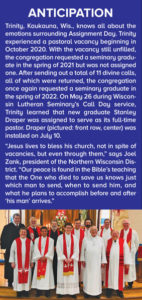 |
A retired district president shares his insights into the joys and challenges that are a part of each Assignment Day.
Anticipation. Excitement. Joy.
That’s what Assignment Day is for so many—the graduates, their families, and the congregations and schools that are waiting for news of who may fill their vacancy. Even casual WELS bystanders can’t help but be interested in looking over the assignment list after it is published.
Behind the scenes, of course, there is much in the way of preparation prior to this day. Members of the Assignment Committee—presidents of each of the 12 districts as well as the synod president and first and second vice presidents—work with congregations and schools to understand their ministry needs. It becomes a challenge to weigh the needs of a number of congregations with the gifts of the candidates available. Not everyone will be a fit for every ministry. The Lord grants gifts to his people and to his full-time servants differently. The Assignment Committee tries to match each graduate’s gifts with the ministry of a school or congregation.
It is true that a district president will weigh the needs of the congregations and schools within his district, but he also works together with 11 other district presidents to weigh the needs and consider the opportunities for mission and ministry across the synod. These leaders work together for the benefit and blessing of the church as a whole. Assignment Committee members collaborate and cooperate, enabling WELS ministries to move forward with confidence. The Lord is at work through them to carry out this important task. That’s a humbling blessing and responsibility.
Anticipation becomes joy
You can easily picture the excitement and elation of a congregation or a school that has been without a full-time gospel servant for some time—in some cases through the disappointment of more than one Assignment Day—as it hears that its vacancy is being filled. Ministry that had been on hold may be reinvigorated. Needs that have been unmet may now be filled. Leaders and members have a new spring in their step. You can see the gleam in their eyes as they talk about what the assignment will mean for the spiritual life of their congregation members or the students in their school.
I’ve witnessed such renewal and reinvigoration in a ministry as the Holy Spirit works through a newly called pastor, teacher, or staff minister. The Word never changes, but opportunities do. It may be that the Lord has used a congregation’s time without a full-time servant to allow the congregation an opportunity to reevaluate and reconsider its ministry. When a candidate is assigned, the congregation may be in a position to be used by God to strengthen the ministry that has been in place. For other congregations it may be a chance to expand ministry. The Lord brings pastor and people, teacher and students, together to work in partnership in the gospel and to recognize and seize opportunities he is placing before them.
Anticipation brings disappointment
When a congregation or school asks, “Did we receive a graduate assignment this year?” and the answer is, “No, there won’t be an assignment . . .” there may be silence on the other end of the phone. Anticipation turns to disappointment.
There is certainly a human element in the assignment process. Every one of those called to serve on the Assignment Committee is aware there are limitations and weaknesses that they bring to the table. Yet in what task or responsibility that we have as God’s people are there not limitations and weaknesses? The apostle Paul was perhaps the paragon when it came to acknowledging his limitations and weakness as he carried out his ministry. Yet he knew—and you and I know—that God works through and despite the weaknesses of his people. “When I am weak, then I am strong” (2 Corinthians 12:10).
 Congregations do face disappointment. One of those disappointments may be a long-awaited assignment that is not filled. In May 2022 there were 90 requests for pastoral graduates and fewer than 30 candidates available. The words of Jesus are as true today as when he first spoke them, “The harvest is plentiful but the workers are few” (Matthew 9:37).
Congregations do face disappointment. One of those disappointments may be a long-awaited assignment that is not filled. In May 2022 there were 90 requests for pastoral graduates and fewer than 30 candidates available. The words of Jesus are as true today as when he first spoke them, “The harvest is plentiful but the workers are few” (Matthew 9:37).
That disappointment is not easy to overcome. We set our hearts on what we believe will be beneficial for our congregations, schools, and God’s kingdom. Certainly, filling classrooms and pulpits is good and beneficial. The Lord works through his means—the means of grace in Word and sacrament—and hearts hungering for his grace are fed, souls craving certainty in a world of uncertainty are given gospel certainty in Christ.
It is often true that when there is no full-time shepherd, a congregation’s ministry no longer advances but may contract. Ministry activity slows.
While that’s a reality in some situations, it needn’t be that way. Oh, it will take working together on the part of a congregation, encouraging one another, and stepping up to fill some ministry holes that were otherwise filled by a former pastor or teacher. But the means of grace does that—it moves the hearts of God’s people to serve, step out of their comfort zone, and be involved in the life and ministry of their congregation. What is true for called servants is also true for members: “We have different gifts according to the grace given to each of us. . . . If [your gift] is serving, then serve; . . . if it is to encourage, then give encouragement; if it is giving, then give generously; if it is to lead, do it diligently; if it is to show mercy, do it cheerfully” (Romans 12:6-8).
Looking ahead
Which leads to the question: How will the church be served in future generations? As the mantle is passed from one prophet to another . . . from one pastor to others . . . from teachers who have encouraged youth to consider the full-time ministry of the gospel, how will the church be served? “Ask the Lord of the harvest, therefore, to send out workers into his harvest field” (Matthew 9:38).
Author: Donald Tollefson
Volume 109, Number 09
Issue: September 2022







